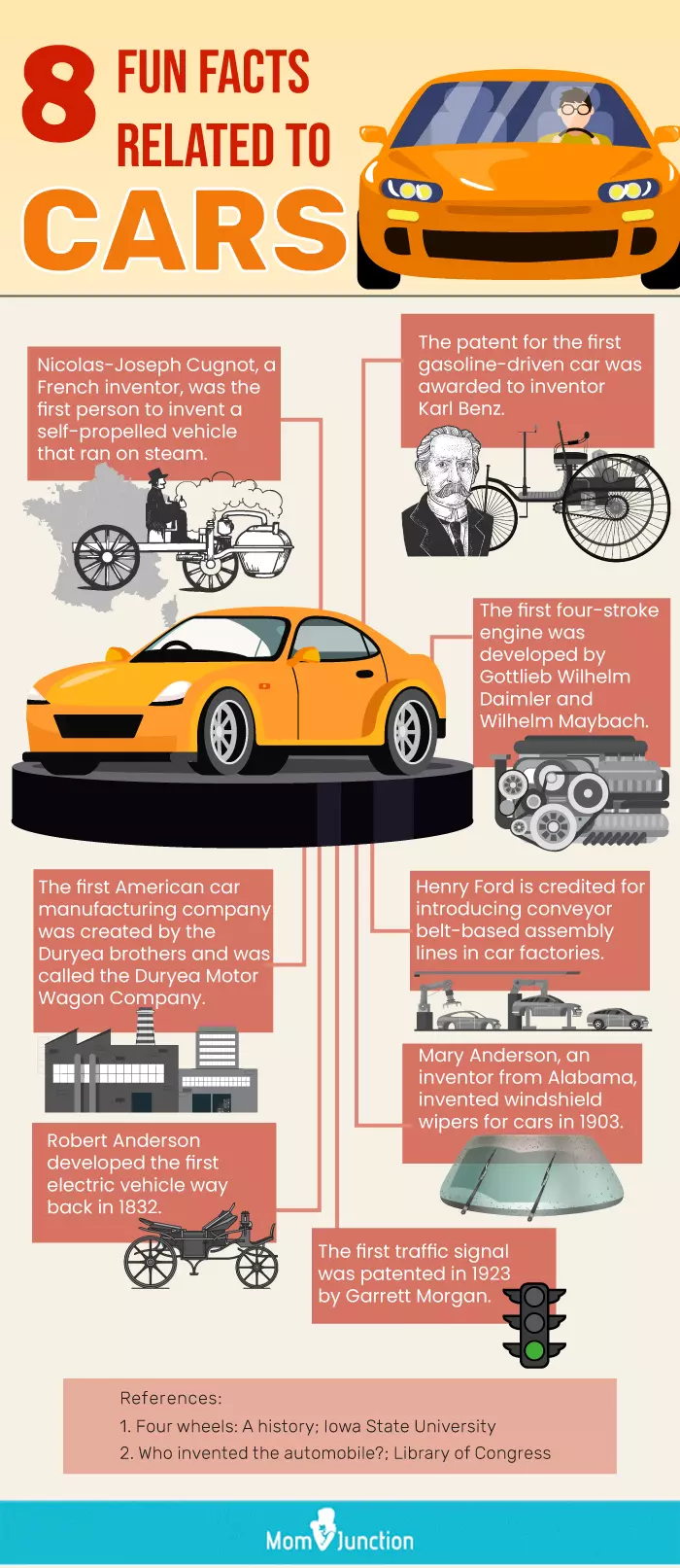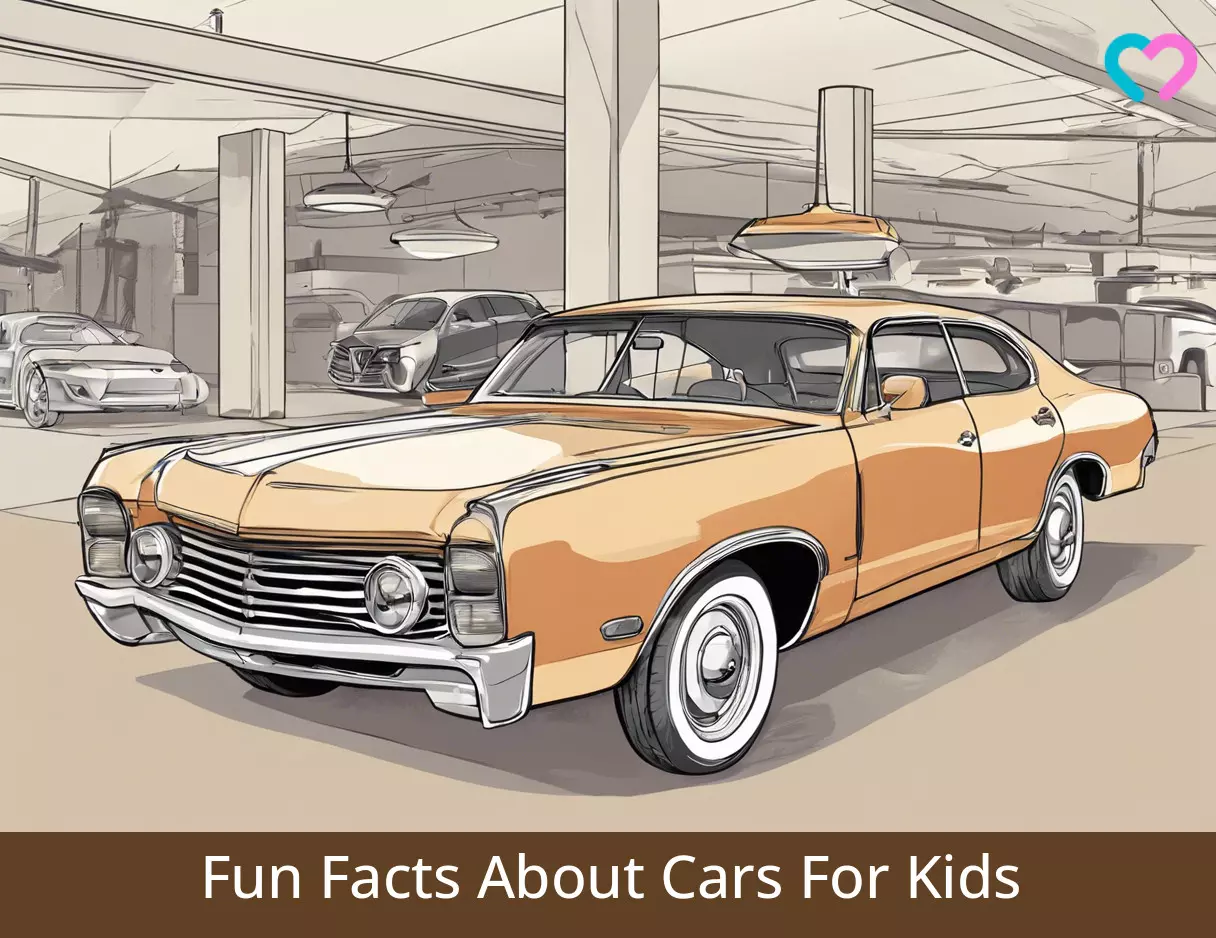
Image: ShutterStock
From toy cars to car rides, children are fascinated by cars and their speed. They usually like the design and features and wish to understand them well. So, here are some interesting facts about cars for kids to satisfy their curiosity and provide a deeper understanding of automobiles. If your child is familiar with most car models and loves playing with toy cars, these facts will keep them engaged. So, share these cool facts about cars to encourage their interests.
Key Pointers
- Children are fascinated by cars from small toys to car rides.
- Cars possess more than just make, speed, and design that are fascinating.
- Cars are made up of over 30 thousand parts and outnumber people worldwide.
- Self-driven electric cars are a futuristic technology that will soon dominate motorways.
Car Information For Kids
1. There Are More Cars Than People In The World:
According to the World Population Clock, the population of the world is estimated at 7.4 billion whereas according to Elite Daily, there are more than 10 billion cars in the world. The question that arises is who drives them. The truth is many cars are manufactured every year, not all of which are in use. Some of the unused or unsold ones are disposed of or left to rust forever.
2. Car Is The Most Recycled Product In The World:
You may think that all cars contribute to pollution and destroy the environment; in fact, cars are a huge contributor to the economy in the form of maintenance also. Also, you’ll be surprised to know that approximately 95% of the cars that have stopped working are recycled. Roughly 27 million cars are reprocessed every year.
3. There Are Almost 30K Parts In A Car:
An average car has as many as 30,000 parts in it. Imagine solving a puzzle out of so many units. Constructing a car is almost equivalent to that. When these parts and accessories are put together in the right places, it forms the car that we drive. Most of these units are recyclable, like the battery, oil filters, scrap metals and tires.
4. The Longest Living Car Was 82 Years Old:
Graduation gifts are special. But the Piccadilly-P1 Roadster by Rolls-Royce that Allen Swift of Massachusetts was gifted by his dad after his graduation was a little too special for him. He owned, drove and treasured it for a good 82 years.
5. The Longest Traffic Jam Was Recorded On February 16, 1980:

Image: Shutterstock
According to Guinness World Records, the longest traffic jam in the world spanned from Lyon to Paris when hundreds of tourists were on their way back home from Ski holidays. A stretch of 109 miles was at a standstill on the French Autoroute as a result of poor weather and traffic blockage.
6. The First Automobile Accident Took Place In 1891:
The first car accident occurred near Cleveland in Ohio City. It was James William Lambert’s car which hit a tree root and got sidetracked leading it to crash into a hitching post. Though the injuries were minor, it left its imprint on the history of cars.
7. Volkswagen Owns Companies Like Audi:
If you thought Volkswagen was a single brand, you are wrong. The German company boasts of owning several other prestigious car companies like Porsche, Audi, Bugatti, Bentley, Lamborghini, and overseas brands SEAT and Skoda.
8. Self Driven Cars Soon To Feature On Roads:
Autonomous vehicles or driverless cars are currently in existence in the form of a prototype, an innovation developed by Google.
These cars could possibly put a check on the number of vehicles actually needed on the road to commute and also decrease road accidents. The futuristic automobiles are expected to be available for commercial purposes by the year 2020.
9. Self Driven Cars Would Require Driver’s License:
Future automatic cars will need a license for driving on open roads. In the US, Nevada was the first state to authorize these cars on their roads and the first ever autonomous vehicle license was imprinted as a result.
10. How Much Did A Car Cost In 1908?
Back in the beginning of the 20th century, the cost of buying a car would be around $825. The Ford Model T was worth $950. The price is quite unimaginable but it would be around thousands of dollars in today’s time.
 Quick fact
Quick factFun Facts About Cars
Here are some added trivia on cars that will intrigue your kid:
- Ferrari, the reputed company, has an exclusive and strict policy of manufacturing a maximum number of 14 cars per day.

Image: Shutterstock
- The “New Car Smell” may be a thing you love. But it is actually dangerous to inhale it for a long time since it is made up of assorted volatile compounds.
- Benz was the first car company up for sale in 1887.
- Nicolas-Joseph Cugnot built the first full-scale working steam-powered car in 1769. It could reach speeds of 2.5mph (4km/h).
 Trivia
Trivia- Putting the right kind of oil in the car engine is not as simple as it seems. A rough estimate says that in one year over 150,000 drivers end up putting the wrong kind of fuel in their car.
- Driving at 90kmph, it would take six months to reach the moon.
- The most expensive car ever made was a 1931 Bugatti Royale Kellner Coupe, and it cost $8.7 million.
- Hitler begged for a car loan from Mercedes-Benz when he was in jail.
- Toyota is the largest producer of cars with 13,000 manufactured every day.

Image: Shutterstock
- 165,000 cars are produced every day world over.
Frequently Asked Questions
1. Where did the word “car” come from?
The word car is believed to have originated from the Latin word carrus, which means a “wheeled vehicle.” This Latin word, in turn, has Clectic roots and has been derived from Gaulish karros, meaning “chariot.”
2. Where was the first car made?
The first car was made in Mannheim, Germany, in 1886 by Karl Benz. He named his car the Patent Motorwagen (1).
3. How do cars work?
Cars operate using a complex system of components, including the engine, transmission, and wheels. The engine converts fuel into mechanical energy, which is then transmitted through the transmission system to adjust power and provide speed to the wheels.
4. How have cars evolved over the years?
Cars have come a long way since their invention. The first automobiles were horse-drawn carriages, but technological advancements over the years have led to the development of electric cars, hybrids, and self-driving vehicles.
5. What are the benefits of teaching children facts about cars?
Learning about cars introduces children to various aspects of vehicles. Knowing how cars work can encourage critical thinking and problem-solving skills in children. In addition, it may help them understand cause-and-effect relationships. Exploring the world of cars can ignite a child’s curiosity and interest in engineering and technology.
6. What age is appropriate to start teaching children facts about cars?
The appropriate age to begin teaching children facts about cars can vary based on the child’s interests and maturity level. However, generally, parents can introduce basic car information to children around four or five years old.
7. Are there any educational resources available to help parents teach children facts about cars?
Books, websites and online platforms, educational videos, and toys are fun and educational resources to help children learn facts about cars. Visiting a car museum and exhibition can provide them with hands-on learning opportunities that can make learning fun for children.
8. What are the different types of cars?
Cars may be classified based on their appearance, the type of fuel used, or price. Common types include sedan (spacious with four doors), coupe (traditionally has two doors but may include four doors with sleek interiors), sports car (sleek and expensive), station wagon (sedan-like with extended roof line), hatchback (compact with a squared off roof), convertible (retractable roof), sport-utility vehicle (SUV- taller and boxier version of sedan), minivan (family car with adjustable seating), and pick up truck (has rear open cargo bed). Other types may include electric cars, gasoline-powered cars, and hybrid cars (run on liquid fuel as well as electricity).
9. What car safety rules should I teach my children?
Start with basic safety rules, such as the importance of wearing a seatbelt. Also, teach them about the different road signs.
Sometimes, giving your kids the opportunity to learn more about their interests may bring exceptional results that you could have never imagined. If your little one is a fan of cars and automobiles and is enthusiastic about knowing more about them, you must encourage them to learn more by sharing facts about cars for kids. Your little one will be delighted to learn new things about cars and the automobile industry. Introducing them to cars coloring pages can also be a fun and engaging way to develop their interest while allowing them to explore their creativity. So, give them a chance to explore this interest in the best way possible.
Infographic: Fun Facts About Cars For Children
Cars are a never-ending source of entertainment and discussion for most children. The speed and sounds of a car stoke their imagination. Discover some interesting automotive facts in this infographic that children may enjoy. Illustration: Momjunction Design Team
Illustration: Fun Facts About Cars For Kids

Image: Stable Diffusion/MomJunction Design Team
Check out this fun video about cars! Learn 7 amazing facts about cars and watch a funny sock puppet show! Don’t miss out!
References
- Who made the first car and how did they do it?
https://www.atse.org.au/news/ - The first speeding ticket in the USA.
https://automotivehistory.org/the-first-speeding-ticket-in-the-usa/
Community Experiences
Join the conversation and become a part of our nurturing community! Share your stories, experiences, and insights to connect with fellow parents.
Read full bio of Elisa Yi
Read full bio of Manjiri Kochrekar
Read full bio of Harshita Makvana
Read full bio of Trisha Chakraborty



















